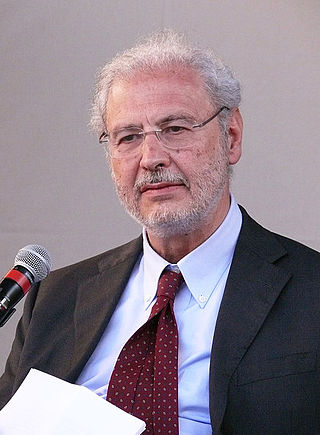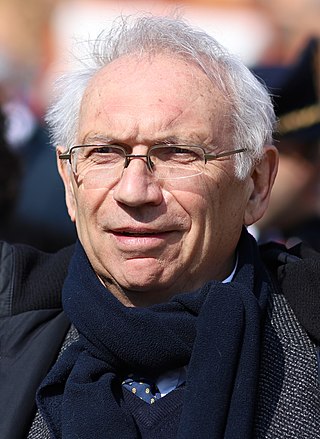
The University of Bologna is a public research university in Bologna, Italy. Founded in 1088 by an organised guild of students (studiorum), it is the oldest university in continuous operation in the world, and the first degree-awarding institution of higher learning. At its foundation, the word universitas was first coined. It is one of the most prestigious universities in Italy and Europe, commonly ranking first in national and international rankings. With over 90,000 students, it is also one of the largest universities in Europe.

John Mark Deutch is an American physical chemist and civil servant. He was the United States Deputy Secretary of Defense from 1994 to 1995 and Director of Central Intelligence (DCI) from May 10, 1995, until December 15, 1996. He is an emeritus Institute Professor at the Massachusetts Institute of Technology and serves on the boards of directors of Citigroup, Cummins, Raytheon, and Schlumberger Ltd. Deutch is also a member of the Trilateral Commission.

George McClelland Whitesides is an American chemist and professor of chemistry at Harvard University. He is best known for his work in the areas of nuclear magnetic resonance spectroscopy, organometallic chemistry, molecular self-assembly, soft lithography, microfabrication, microfluidics, and nanotechnology. A prolific author and patent holder who has received many awards, he received the highest Hirsch index rating of all living chemists in 2011.

Harriet Ritvo is an American historian who specializes in British history, particularly environmental history and the history of natural history. Ritvo is the Arthur J. Connor Professor of History at MIT and a member of the Program in Science, Technology and Society, and she was the head of MIT's History Faculty from 1999-2006.
Michael Joseph Piore is an American economist and professor of economics and political science at the Massachusetts Institute of Technology. His research centers on labor economics, immigration, and innovation. He was awarded a MacArthur Fellowship in 1984.

Sarah M. Whiting is an American architect, critic, and academic administrator. Whiting is currently Dean and Josep Lluís Sert Professor of Architecture at Harvard Graduate School of Design, in addition to being a founding partner of WW Architecture, along with her husband, Ron Witte. She previously served as Dean and William Ward Watkin Professor of Architecture at Rice School of Architecture. In addition to her work as an academic administrator, Whiting is most commonly identified as an intellectual figure within the field of architecture's "post-critical" turn in the early 2000s.

Esther Duflo Banerjee, FBA is a French–American economist who is a professor of Poverty Alleviation and Development Economics at the Massachusetts Institute of Technology (MIT). She is the co-founder and co-director of the Abdul Latif Jameel Poverty Action Lab (J-PAL), which was established in 2003. She shared the 2019 Nobel Memorial Prize in Economic Sciences with Abhijit Banerjee and Michael Kremer, "for their experimental approach to alleviating global poverty".
Donatella della Porta is an Italian sociologist and political scientist, who is Professor of political science and political sociology at the Scuola Normale Superiore. She is known for her research in the areas of social movements, corruption, political violence, police and policies of public order. In 2022, she was named a fellow of the American Academy of Arts and Sciences.
Richard K. Lester is an American nuclear engineer, educator, and author. He is the Japan Steel Industry Professor and Vice Provost at the Massachusetts Institute of Technology, where he oversees the international engagements of the Institute. He previously served as Head of the Department of Nuclear Science and Engineering at MIT and he is the founding Director and Faculty Chair of the MIT Industrial Performance Center.

Sheila Sen Jasanoff is an Indian American academic and significant contributor to the field of Science and Technology Studies. In 2021 she was elected to the American Philosophical Society. Her research has been recognized with many awards, including the 2022 Holberg Prize "for her groundbreaking research in science and technology studies."
Amy Nadya Finkelstein is a professor of economics at the Massachusetts Institute of Technology (MIT), the co-director and research associate of the Public Economics Program at the National Bureau of Economic Research, and the co-Scientific Director of J-PAL North America. She was awarded the 2012 John Bates Clark Medal for her contributions to economics. She was elected to the National Academy of Sciences and won a MacArthur "Genius" fellowship in 2018.
Suzanne Scotchmer was an American professor of law, economics and public policy at the University of California, Berkeley and also a noted author on many economic subjects. She earned her B.A. from University of Washington magna cum laude in 1970, her M.A. in statistics from UC Berkeley in 1979, and her PhD in economics from UC Berkeley in 1980.

Carlo Trigilia is an Italian academic and politician, who served as minister for territorial cohesion from 28 April 2013 to February 2014. He is a professor emeritus in economic sociology at the University of Florence.
Sergio Fabbrini is an Italian political scientist. He is Head of the Department of Political Science and Professor of Political science and International relations at Libera Università Internazionale degli Studi Sociali Guido Carli in Rome, where he holds the Intesa Sanpaolo Chair on European Governance. He had also the Pierre Keller Visiting Professorship Chair at the Harvard University, Kennedy School of Government (2019/2020). He is the co-founder and former Director of the LUISS School of Government He is also recurrent professor of Comparative Politics at the Institute of Governmental Studies at the University of California at Berkeley.
Bruce Mazlish was an American historian who was a professor in the Department of History at the Massachusetts Institute of Technology. His work focused on historiography and philosophy of history, history of science and technology, artificial intelligence, history of the social sciences, the two cultures and bridging the humanities and sciences, revolution, psychohistory, history of globalization and the history of global citizenship. He worked to build the latter two fields of inquiry into a public intellectual movement, through initiatives such as the New Global History conferences.
Manlio Graziano is an Italian scholar specializing in geopolitics and geopolitics of religions. He lives in Paris.
Kenneth Keniston was an American social psychologist.

Patrizio Bianchi is an Italian economist and academic, current chairholder of the UNESCO Chair in Education, Growth and Equality. He served as minister of education in the Draghi Cabinet from 2021 to 2022.
Pierre Singaravélou is a French Global historian who is a British Academy Global Professor of History at King’s College London. He is also full Professor of Modern History at Paris 1 Panthéon-Sorbonne University and director of the Center for Asian History (Sorbonne). Professor Singaravélou is the former director of the Sorbonne University Press and an honorary fellow of the Institut universitaire de France.









